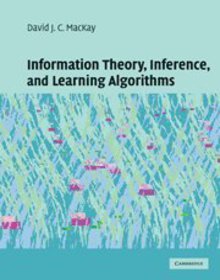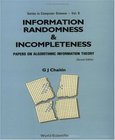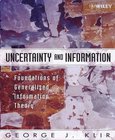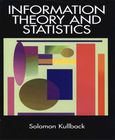Information Theory, Inference and Learning Algorithms

Book Details:
| Publisher: | Cambridge University Press |
| Series: | Cambridge University , Learning |
| Author: | David J. C. MacKay |
| Edition: | 1 |
| ISBN-10: | 0521642981 |
| ISBN-13: | 9780521642989 |
| Pages: | 640 |
| Published: | Oct 06 2003 |
| Posted: | Nov 19 2014 |
| Language: | English |
| Book format: | |
| Book size: | 11.13 MB |
Book Description:
Information theory and inference, often taught separately, are here united in one entertaining textbook. These topics lie at the heart of many exciting areas of contemporary science and engineering - communication, signal processing, data mining, machine learning, pattern recognition, computational neuroscience, bioinformatics, and cryptography. This textbook introduces theory in tandem with applications. Information theory is taught alongside practical communication systems, such as arithmetic coding for data compression and sparse-graph codes for error-correction. A toolbox of inference techniques, including message-passing algorithms, Monte Carlo methods, and variational approximations, are developed alongside applications of these tools to clustering, convolutional codes, independent component analysis, and neural networks. The final part of the book describes the state of the art in error-correcting codes, including low-density parity-check codes, turbo codes, and digital fountain codes -- the twenty-first century standards for satellite communications, disk drives, and data broadcast. Richly illustrated, filled with worked examples and over 400 exercises, some with detailed solutions, David MacKay's groundbreaking book is ideal for self-learning and for undergraduate or graduate courses. Interludes on crosswords, evolution, and sex provide entertainment along the way. In sum, this is a textbook on information, communication, and coding for a new generation of students, and an unparalleled entry point into these subjects for professionals in areas as diverse as computational biology, financial engineering, and machine learning.
Book categories:
Programming , Software , Information Theory , Modeling & Simulation , Languages & Tools , Algorithms , Artificial Intelligence , Neural Networks , Theory of ComputingDownload Link:
Related Books:
Information, Randomness and Incompleteness
Papers on Algorithmic Information Theory
2nd Edition
God not only plays dice in quantum mechanics, but even with the whole numbers! The discovery of randomness in arithmetic is presented in my book Algorithmic Information Theory published by Cambridge University Press. There I show that to decide if an algebraic equation in integers has finitely or infinitely many solutions is in some cases absolutely intractable. I exhibit an infinite series of such arithmetical assertions that are random arithmetical facts, and for which it is essentially the case that the only way to prove them is to assume them as axioms. This extreme form of Gdel incompleteness theorem shows that some arithmetical truths are totally...
Uncertainty and Information
Foundations of Generalized Information Theory
Deal with information and uncertainty properly and efficiently using tools emerging from generalized information theoryUncertainty and Information: Foundations of Generalized Information Theory contains comprehensive and up-to-date coverage of results that have emerged from a research program begun by the author in the early 1990s under the name "generalized information theory" (GIT). This ongoing research program aims to develop a formal mathematical treatment of the interrelated concepts of uncertainty and information in all their varieties. In GIT, as in classical information theory, uncertainty (predictive, retrodictive, diagnostic, prescriptive, and the like) is viewed as a manifestation of information deficiency, while information is ...
Information theory and statistics
Highly useful text studies the logarithmic measures of information and their application to testing statistical hypotheses. Topics include introduction and definition of measures of information, their relationship to Fisher's information measure and sufficiency, fundamental inequalities of information theory, much more. Numerous worked examples and problems. References. Glossary. Appendix....
2007 - 2021 © eBooks-IT.org



